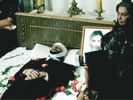Eye For Film >> Movies >> Beirut Open City (2008) Film Review
Set during the Syrian occupation of Lebanon in the 1990s, Habchi’s film opens with newsreel footage of the Lebanese civil war and its chaotic aftermath (which prompted the occupation), suddenly replaced by a striking image of a fleet of 4x4s, packed with automatic-rifle wielding security guards, zooming in a blur past the camera.
The scene speedily and economically sets the tone of a tense and atmospheric thriller that takes more than just its title from Roberto Rossellini’s classic Rome, Open City. It, too, deals with life in a city reeling from a devastating war, in which a skeletal government infrastructure conceals a world of secrecy, betrayal and violence; one into which innocents and outsiders venture at their peril.

Both terms could be applied to the protagonist, Khaled El Nabawi’s Egyptian photojournalist who is living in the city and attempting to make a film about the activities of the Lebanese intelligence and security agencies, using clandestinely-shot camcorder footage and eyewitness testimonies.
He meets and cultivates a torture victim contact (Rodney Haddad), who is active in the anti-Syrian underground. At the same time, his money and status (together with a Lebanese girlfriend) have won him entry into the higher echelons of Beirut society. He attempts to find out more through a security guard in one of the most notorious groups, those delegated to protect the US ambassador, and a dancer with connections to the country’s political elite. He flirts with her outrageously, arousing his girlfriend’s jealousy, and finds himself attracted to the glamour of Beirut’s westernised nightclub society.
Meanwhile a young man from a rural area of Lebanon visits the city on business and is accidentally shot by one of the ambassador’s guards. His family and the local tribal leaders demand that action be taken but a government official invited to the funeral makes it clear that the men involved will never be prosecuted. Calling on an older tradition of Lebanese justice, his community prepare for revenge – a revenge that will have consequences for all the characters in the film...
Habchi orchestrates the seemingly disparate plot strands with considerable skill, building a sense of disorientation and withheld information that reinforces his main themes. When the plot twists come they pack a punch. The torture scenes are graphic and gruelling, but never gratuitous, and a twilit ambush on a forest road is as good a piece of action cinema as any I’ve seen.
But it’s all in the service of a serious point – that outside interference in a country’s affairs by a powerful neighbour is bound to create an atmosphere of mistrust and disinformation, bringing out people’s worst (and best) instincts as they choose whether to resist or collaborate with the occupier. And, as Habchi makes very clear, collaboration takes many forms.
He’s well served by his two principal actors. Nabawi and Haddad may be familiar to European audiences (through Ridley Scott’s Kingdom Of Heaven and the Lebanese-set romcom Caramel respectively) and one can only hope that their profile helps to give this film a wider audience. It’s a little rough around the edges in parts, and makes a fairly heavy-handed link with the ‘war on terror’ at the end. But for the most part it’s a powerful and heartfelt film about an area which it’s easy to dismiss as ‘one of those places where there’s always trouble’.
Reviewed on: 23 Oct 2008

















